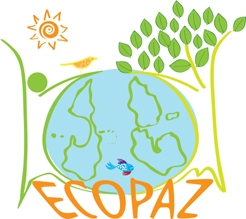Eco-pacifist Education as a Tool for Social Evolution
Submitted by Jacqueline Flores Otero on
Throughout the years, our role as agents of change in a dynamic society such as the one we live in has acquired major relevance. Our society is not only threatened by the economic challenges that are actually being faced in the world, but by the crisis that exists in what respect to the human values and its consequences in the environment.
As every evolution process entails time, every opportunity to change offers a fertile ground for the incorporation of activities that go hand in hand with the development of new knowledge. And it is precisely through the Ecopaz Project that Dr. Carlos Agustín Muñoz Osorio utilizes educational resources that go beyond being a learning channel, but also provide tools that help us understand and transform the problems that our Puerto Rican society currently faces.
Inspired by the "inmensity of the mistery that surrounds us", his deep sensitivity to nature and the need to deal with the eco-environmental threats, Dr. Muñoz Osorio specialized in Education in the area of Biology, with a focus on environmental and eco-pacifist education. Since his early years, experiences provided by his parents exposed him to different natural experiences such as visits to the limestone hummocks of Dorado, raising of corral animals, visits to the Rio La Plata, sowing and fishing. As a witness of all the invaluable treasures offered by our island, and the sad state of decadence that accompanies the social-ecological environment, Dr. Muñoz Osorio takes action by participating as a volunteer of numerous programs and workshops that gave him access not only to teachers, but also to students and citizens.
Deeply rooted to his commitment with the environment and critical of the ecocidal and genocidal character of our current society, Dr. Muñoz Osorio develops a virtual space designated as "Ecopaz Project". Ever since the 90's this project, whose main foundation is based on the design of creative and practical educational methods, has served to create awareness about the social and ecological responsibilities that pertain to us. As a consequence, this project not only educates, but also induces the development of a critical reflection that involves the consequences of our relation with the physical environment, the knowledge of history and cultural bases and a broader comprehension of the limitations and possibilities provided by the cognitive process of human beings.
Objectives of the Ecopaz Project
The main objective of the Ecopaz Project is to provide a reflexive space that stimulates recognition of our role as agents of change before the social-ecological and environmental conflicts that exist. Distinct from traditional teaching methods whose foundation is the theory of historical paradigms, the Ecopaz Project, as well as the workshops of education that Dr. Muñoz Osorio manages, allows the audience to experience a personal connection with the environment. If we really thought of what is the most appropriate way to achieve changes that optimize our life quality, scientific and social education is one of the main routes to consider. There is no way in which, we as human beings, can be sensitive to the needs that surround us, if we are not aware of what these needs are. Through the use of demonstration techniques, trips, group discussions, the development and provision of educational materials and the use of instructive movies, Dr. Muñoz Osorio serves as a liaison between the environmental system and our society.
Impact of the Ecopaz Project
In face of the significant changes that we are experiencing, the exploration of the social system and our environment has become a need. With the passage of time, not only do human beings evolve, but the relationships that unite them and the environmental context in which they act evolve. When there is a lack of harmony in the co-evolution of these, it is our responsibility to take action. The strength of the Ecopaz Project relies precisely in that it allows for the integration of scientific concepts, the use of educational and technological resources, and the expression of human values through the concrete interaction of the environment and humanity.
Currently, the creation of this project has resulted in the development of the theoretical-philosophical reflection in what regards to social-environmental aspects and it has allowed the production of curricular and didactic tools that intent exemplify its foundations. Among the accomplishments of the Ecopaz Project: four activity guides, audiovisual materials, an internet site, workshops, presentations and collaborations that have been established in the past 10 years. Last, and not least important, this project exposes a "forest" of alternatives to deal with the situation or crisis that we are going through; to present practical educational models that significantly induce our pro-activity as society to deal with the social-environmental and ecological challenges.
Without a doubt, the life and professional achievements of Dr. Muñoz Osorio are an example to follow. If there is anything that his contribution to our island reflects, it is how essential it is to give meaning to each of our experiences and the environmental life that requires our continual attention. While the act of reflection that is encouraged by the Ecopaz Project is not a requirement for our survival in this world, it does represent the heart itself of the educational process, that when combined with a world of experiences, it becomes a resource of power for the achievement of social and eco-pacifist changes.
For more information regarding the Ecopaz Project or Dr. Carlos Agustín Muñoz Osorio, visit http://projectoecopaz.org.








